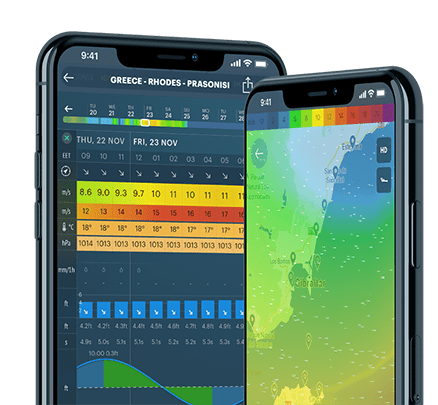
Explore the different types of storms
Storm is a general name for various kinds of major atmospheric, oceanic and terrestrial disturbances, which are usually strong winds, but also a whole set of weather phenomena with the prefix "strong" or "big": rain, snow, lightning, and so on. In this new lesson of the Windy.app Meteorological Textbook (WMT) for better weather forecasting you will learn the different types of storms and their main features.
Dust storm
In a nutshell: a dust storm occurs when a strong wind (more than 10 m/s) makes a huge amount of dust rise up into the atmosphere — millions of tons! This dust can be transported up to several thousand kilometers.
Sand storm
A severe sandstorm hit major Brazilian localities such as Franca, Barretos, and several others on September 26th, 2021. A huge cloud of reddish dust made its path through the living quarters, causing the visibility level to go down to zero. Luckily, no one was fatally injured. However, how dangerous could a sandstorm be and where does it usually happen? This knowledge may help you avoid a sandstorm or survive it.
Thunderstorm
Thunderstorms have very turbulent environments. Through the process of convection in the cloud, huge masses of air, water droplets and ice crystals move around at high speed. These particles are constantly colliding and rub against each other, which leads to electrification: just think of sparks we all get while combing dry hair or removing a fibrous sweater. These sparks are just tiny bolts of lightning.
Learn more about thunderstorms
Volcanic lightning (dirty thunderstorm)
Volcanic lightning also called dirty thunderstorms is a lightning that appear during a volcanic eruption, so it happens not only in clouds. The mechanism of spectacular lightning happening directly in an eruption column made of hot volcanic ash seems to be pretty much the same. With the exception of the fact that, instead of your hair and the balloon surface rubbing together, it is particles of rocks, ash, water, steam, and volcanic gases that are propelled from the depths of the earth at a mind-blowing speed.
Learn more about dirty thunderstorms
Tropical cyclone (storm system)
Tropical cyclones are a type of low-pressure weather storm system. hey occur over warm seas and bring powerful thunderstorms, heavy rainfall, and storm force winds. The name "tropical cyclone" is scientific. Depending on the part of the world, they are simply called hurricanes (United States and Latin America) and typhoons (Asia and Australia). In this lesson, we will take a separate look at how these cyclones form.
Learn more about tropical cyclones
Geomagnetic storm
A geomagnetic storm is a disturbance of the Earth 's magnetic field in response to excessively strong solar wind currents. Our planet is a large magnet that is surrounded by a magnetic field, which in turn protects us from cosmic radiation. But sometimes this radiation becomes too strong.
Learn more about geomagnetic storms
Explore the different types of all the main weather phenomena:
- Types of air temperature
- Types of precipitation
- Types of wind
- Types of clouds
- Types of ocean currents
- Types of storms
Text: Windy.app, Ivan Kuznetsov
Cover photo: Jeremy Bishop / Unsplash
Latest News
Professional Weather App
Get a detailed online 10 day weather forecast, live worldwide wind map and local weather reports from the most accurate weather models.
Compare spot conditions, ask locals in the app chat, discover meteo lessons, and share your experience in our Windy.app Community.
Be sure with Windy.app.



